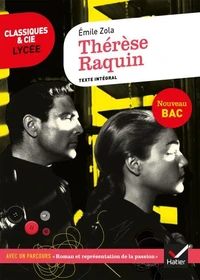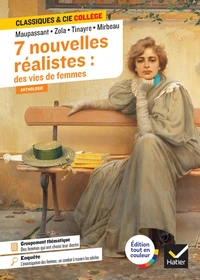This carefully crafted ebook: "The Complete Rougon-Macquart Cycle (All 20 Unabridged Novels in one volume)"is formatted for your eReader with a functional and detailed table of contents.
Les Rougon-Macquart is the collective title given to a cycle of twenty novels by French writer Émile Zola. Subtitled Histoire naturelle et sociale d'une famille sous le Second Empire (Natural and social history of a family under the Second Empire), it follows the life of a fictional family living during the Second French Empire (1852-1870) and is an example of French naturalism.
Table of Contents:
1.
La Fortune des Rougon (1871)
2. La Curée (1871-2)
3. Le Ventre de Paris (1873)
4. La Conquête de Plassans (1874)
5. La Faute de l'Abbé Mouret (1875)
6. Son Excellence Eugène Rougon (1876)
7. L'Assommoir (1877)
8. Une Page d'amour (1878)
9. Nana (1880)
10. Pot-Bouille (1882)
11. Au Bonheur des Dames (1883)
12. La Joie de vivre (1884)
13. Germinal (1885)
14. L'Ouvre (1886)
15. La Terre (1887)
16.
Le Rêve (1888)
17. La Bête humaine (1890)
18. L'Argent (1891)
19. La Débâcle (1892)
20. Le Docteur Pascal (1893)
The series began with La Fortune des Rougon (The Fortune of the Rougons), which introduces the Rougonsand the Macquarts. Zola examines the impact of environment by varying the social, economic, and professional milieu in which each novel takes place. La Curée (The Kill) explores the land speculation and financial dealings that accompanied the renovation of Paris during the Second Empire.
Le Ventre de Paris (Savage Paris; also translated as The Fat and the Thin) examines the structure of the Halles, the vast central marketplace of Paris. Son Excellence Eugène Rougon (His Excellency Eugène Rougon) traces the machinations and maneuverings of cabinet officials in Napoleon III's government.
L'Assommoir ( Drunkard)shows the effects of alcoholism in a working-class neighbourhood by focusing on the rise and decline of a laundress, Gervaise Macquart.
Nanafollows the life of Gervaise's daughter as her economic circumstances and hereditary penchants lead her to a career as an actress, then a courtesan. Au Bonheur des dames (Ladies' Delight) depicts the mechanisms of a new economic entity, the department store, and its impact on smaller merchants.
Germinaldepicts life in a mining community by highlighting relations between the bourgeoisie and the working class.
A quite different work, L'Oeuvre (The Masterpiece), explores the milieu of the art world and the relationships among the arts through an examination of the friendship between an Impressionist painter, Claude Lantier, and a naturalist novelist, Pierre Sandoz.
In La Terre (Earth) Zola depicts what he considered to be the sordid lust for land among the French peasantry. In La Bête humaine (The Human Beast) he analyzes the hereditary urge to kill that haunts the Lantier branch of the family.
La Débâcle (The Debacle) traces both the defeat of the French army by the Germans at the Battle of Sedan in 1870 and the anarchist uprising of the Paris Commune. Finally, in Le Docteur Pascal (Doctor Pascal) he uses the main character, the doctor Pascal Rougon, armed with a genealogical tree of the Rougon-Macquart family published with the novel, to expound the theories of heredity underlying the entire series.
ÉmileZola (1840 - 1902), French novelist, critic, and political activist who was the most prominent French novelist of the late 19th century.
He was noted for his theories of naturalism, which underlie his monumental 20-novel series Les Rougon-Macquart, and for his intervention in the Dreyfus Affair through his famous open letter, "J'accuse."
This carefully crafted ebook: "The Complete Rougon-Macquart Cycle (All 20 Unabridged Novels in one volume)"is formatted for your eReader with a functional and detailed table of contents.
Les Rougon-Macquart is the collective title given to a cycle of twenty novels by French writer Émile Zola. Subtitled Histoire naturelle et sociale d'une famille sous le Second Empire (Natural and social history of a family under the Second Empire), it follows the life of a fictional family living during the Second French Empire (1852-1870) and is an example of French naturalism.
Table of Contents:
1.
La Fortune des Rougon (1871)
2. La Curée (1871-2)
3. Le Ventre de Paris (1873)
4. La Conquête de Plassans (1874)
5. La Faute de l'Abbé Mouret (1875)
6. Son Excellence Eugène Rougon (1876)
7. L'Assommoir (1877)
8. Une Page d'amour (1878)
9. Nana (1880)
10. Pot-Bouille (1882)
11. Au Bonheur des Dames (1883)
12. La Joie de vivre (1884)
13. Germinal (1885)
14. L'Ouvre (1886)
15. La Terre (1887)
16.
Le Rêve (1888)
17. La Bête humaine (1890)
18. L'Argent (1891)
19. La Débâcle (1892)
20. Le Docteur Pascal (1893)
The series began with La Fortune des Rougon (The Fortune of the Rougons), which introduces the Rougonsand the Macquarts. Zola examines the impact of environment by varying the social, economic, and professional milieu in which each novel takes place. La Curée (The Kill) explores the land speculation and financial dealings that accompanied the renovation of Paris during the Second Empire.
Le Ventre de Paris (Savage Paris; also translated as The Fat and the Thin) examines the structure of the Halles, the vast central marketplace of Paris. Son Excellence Eugène Rougon (His Excellency Eugène Rougon) traces the machinations and maneuverings of cabinet officials in Napoleon III's government.
L'Assommoir ( Drunkard)shows the effects of alcoholism in a working-class neighbourhood by focusing on the rise and decline of a laundress, Gervaise Macquart.
Nanafollows the life of Gervaise's daughter as her economic circumstances and hereditary penchants lead her to a career as an actress, then a courtesan. Au Bonheur des dames (Ladies' Delight) depicts the mechanisms of a new economic entity, the department store, and its impact on smaller merchants.
Germinaldepicts life in a mining community by highlighting relations between the bourgeoisie and the working class.
A quite different work, L'Oeuvre (The Masterpiece), explores the milieu of the art world and the relationships among the arts through an examination of the friendship between an Impressionist painter, Claude Lantier, and a naturalist novelist, Pierre Sandoz.
In La Terre (Earth) Zola depicts what he considered to be the sordid lust for land among the French peasantry. In La Bête humaine (The Human Beast) he analyzes the hereditary urge to kill that haunts the Lantier branch of the family.
La Débâcle (The Debacle) traces both the defeat of the French army by the Germans at the Battle of Sedan in 1870 and the anarchist uprising of the Paris Commune. Finally, in Le Docteur Pascal (Doctor Pascal) he uses the main character, the doctor Pascal Rougon, armed with a genealogical tree of the Rougon-Macquart family published with the novel, to expound the theories of heredity underlying the entire series.
ÉmileZola (1840 - 1902), French novelist, critic, and political activist who was the most prominent French novelist of the late 19th century.
He was noted for his theories of naturalism, which underlie his monumental 20-novel series Les Rougon-Macquart, and for his intervention in the Dreyfus Affair through his famous open letter, "J'accuse."



















